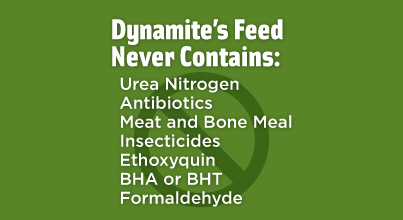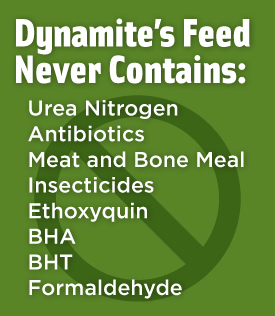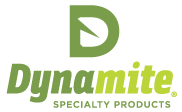
 Every time we hear about animal illness and death caused by feed manufacturing practices, we are heavy-hearted, not only for the animals but for the feed companies who made the mistake. Each feed recall in the industry serves as a reminder about why we go the extra mile and we use each one to tighten our practices. At Dynamite, we are in a unique position because we are one of the few mills that focus on specialty feeds, such as horse, alpaca, and llama. We can, therefore, fulfill a company conviction of providing the highest quality feeds in order to improve the lives of your animals. We will never compromise that conviction.
Every time we hear about animal illness and death caused by feed manufacturing practices, we are heavy-hearted, not only for the animals but for the feed companies who made the mistake. Each feed recall in the industry serves as a reminder about why we go the extra mile and we use each one to tighten our practices. At Dynamite, we are in a unique position because we are one of the few mills that focus on specialty feeds, such as horse, alpaca, and llama. We can, therefore, fulfill a company conviction of providing the highest quality feeds in order to improve the lives of your animals. We will never compromise that conviction.
Our Idaho feed mill follows our company’s mission by completely eliminating the following common dangers that the feed industry faces:
We don’t use urea nitrogen
Urea nitrogen, a main substance in the urine of mammals, has been used in the bovine industry since World War II as a synthetic compound used to supplement common feeds and fertilizers with a protein equivalent. Urea is broken down by some animals, such as cows, in the rumen and converted to ammonia and other nutrients. However, if ammonia escapes the rumen too rapidly, the capacity of the liver is exceeded and ammonia spills into the main blood system causing severe health issues.
For some animals, such as horse or alpaca, this is an even more serious issue as they cannot manage excess urea. Cross-contamination in their feeds can cause severe nitrogen toxicity, kidney failure, or death. In 1973, urea was eliminated from all feed formulas in our mill.
We don’t use antibiotics
Antibiotics are used in many types of feeds to treat disease, prevent disease, and stimulate growth. While some antibiotics can be used for multiple species, some are species-specific and can be toxic to other animals. For example, antibiotics used to treat Coccidiosis, a parasitic disease of the intestinal tract of poultry and swine, can be toxic to horses, llamas, and alpacas, especially recently domesticated species. Dynamite discontinued the use of all drugs and antibiotics in our feed mill in the early 90’s.
We don’t use meat and bone meal
Meat and bone meal with no stated animal source consists of multiple sources of protein derived from the processing of animal carcasses. This substance can include animals that are deceased from disease and even pets that have been euthanized. Rendered meat and bone meal has been used for decades as a cheap source of protein for poultry, swine, and even rabbit and cattle. Concerns over mad cow disease, hoof and mouth disease, and other detrimental health conditions associated with meat and bone meal, are not an issue for us because our mill contains NO animal by-products and we don’t use rendered meat and bone meal in any of our mill products.
Insecticides
To prevent insect infestation, feed mills often treat their stored grain with highly toxic fumigants, which most commonly include methyl bromide, phosphine (also known as Phostoxin, “L-fume”, or aluminum phosphide) and mixtures of carbon tetrachloride and carbon disulfide. With a skull-and-crossbones symbol affixed on its label, fumigants often result in hazardous exposure to workers and to the grain itself. We eliminated fumigants from our mill in the 1980’s.
Preservatives
In order to ensure shelf life, most feed mills use toxic preservatives such as ethoxyquin, BHA, BHT, and formaldehyde. Dynamite feed mill uses only the natural preservatives Vitamin C and Vitamin E.
Why has Dynamite chosen to completely eliminate these elements from our mill? Why not just be careful not to cross-contaminate? The answer lies in understanding industry standards for the feed milling process. All feeds are made in the same mixer and conveyed through the same augers. Then a “flush” is used between batches by running inert grain through the system to remove traces of the previous feed batch, but it is impossible to remove everything. The next batch could contain as much as 5% of the previous feed produced, even after the system is flushed. There is no way any mill can keep from cross-contaminating because of the very nature of the process and the ingredients. How do you eliminate risk? The only way for any mill to make certain that they aren’t cross-contaminating feeds is to remove all these harmful elements and replace them with high-end, safe alternatives. That is exactly what we have done in our mill.
To order Dynamite products, please honor our system by contacting your individual Dynamite distributor who is trained to provide personalized assistance to address the unique needs of your animals. Don’t have a distributor? Call our customer service team at 800-697-7434.







